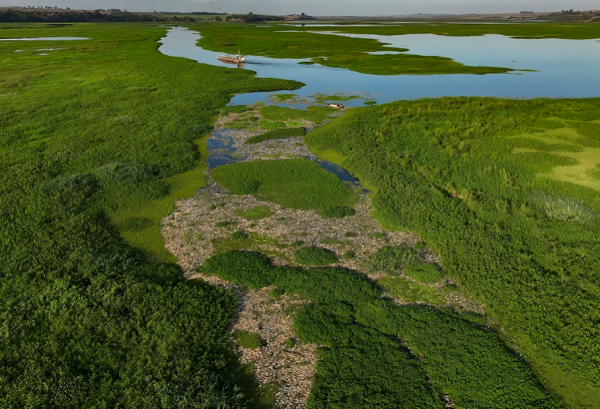- 12:12Morocco Showcase Summit: A Gateway to Tourism and Investment Opportunities
- 11:13Urgent Calls and Delayed Action: A Closer Look at Valencia's Flood Response Crisis
- 10:40Over a Decade of Service to Casablanca's Mobility
- 09:57Trump's Return to Power: Promises and Challenges Ahead
- 09:22Morocco's Unyielding Commitment to Its Territorial Integrity in the Sahara
- 08:48Anticipating Change: U.S. Administration Braces for Migrant Influx Ahead of Trump Presidency
- 08:10Urgent Evacuations as Mountain Fire Rages in Ventura County
- 07:34Drought Devastates Amazon Basin: Over 420,000 Children in Crisis
- 18:05Harris Expected to Concede 2024 Presidential Race to Trump in Historic Address
Follow us on Facebook
Ecological Catastrophe Unfolds as Massive Fish Die-Off Hits Brazil's Piracicaba River
In a devastating environmental incident that has sent shockwaves through Sao Paulo state, an estimated 10 to 20 tons of fish have perished in the Piracicaba River, according to preliminary analyses by state prosecutors. This ecological disaster, discovered on July 7, 2023, is believed to stem from illegal industrial waste dumping allegedly linked to a sugar and ethanol plant.
The incident has sparked widespread concern among environmental authorities, prosecutors, and local communities, highlighting the delicate balance between industrial development and ecological preservation in one of Brazil's most economically significant regions.
Initial investigations point to "irregular discharge of wastewater" from the Sao Jose plant, owned by Estiva and located in Rio das Pedras. The toxic effluent reportedly entered a stream feeding into the Piracicaba River, triggering a catastrophic chain of events that has devastated the river's ecosystem.
Adriano Queiroz, director of licensing at Sao Paulo's environmental agency, painted a grim picture of the situation during a video call. "It will take years for the environment to recover," he emphasized, noting the significant impact on biodiversity due to the sheer number of fish killed and the variety of species affected.
The Piracicaba River holds particular ecological significance as it runs through a protected area known as Tanqua, often called Sao Paulo's "mini-Pantanal" for its resemblance to the famed wetlands known for rich wildlife and natural beauty. The river's basin spans an impressive 4,838 square miles, underscoring the potential scale of the environmental impact.

Prosecutors expressed dismay, stating, "This sad environmental disaster has deeply affected everyone due to its seriousness and widespread impacts." They also highlighted the "very concerning" plight of local fishermen and communities reliant on the river for their livelihoods.
As the investigation progresses, prosecutors await further technical information to determine civil and criminal liabilities. Simultaneously, police are investigating potential environmental crimes, confirmed by Sao Paulo's secretary for public security.
If found responsible, the company at the center of the allegations faces substantial fines for its role in the ecological catastrophe.
CETESB, Sao Paulo's state environmental agency, first received reports of the mass die-off and a pungent odor emanating from the river on July 7. In response, the agency instructed the Salto Grande hydroelectric power plant to increase water release to dilute the contamination.
By July 9, data showed improved dissolved oxygen levels, offering a slight reprieve for surviving fish. However, conditions worsened with reports of another mass die-off in Tanqua, approximately 37 miles from Piracicaba city, where initial fish mortality reports surfaced.
The Piracicaba River holds historical significance in Sao Paulo state, having served as a navigation route for small steamers and a vital water source for sugar cane and coffee farms during the region's early development, according to Brazil's national statistics agency.
This incident serves as a stark reminder of Brazil's environmental challenges, following a severe Amazon drought last year that also led to significant fish mortality.
As authorities continue their investigation and environmental experts assess long-term implications, this ecological disaster underscores the urgent need for stricter environmental regulations and enhanced oversight of industrial activities near vital water bodies. The incident rekindles debates on sustainable development and the imperative to balance economic growth with environmental preservation in Brazil's evolving industrial landscape.



